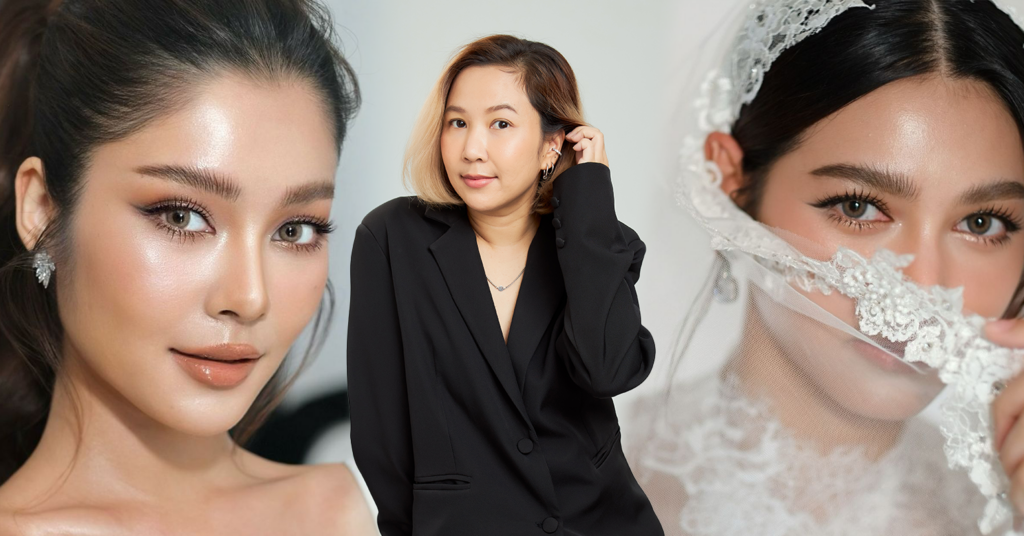Rose-tinted eyelids, berry-smudged lips, and glitter-glitter-glitter. No, this isn’t “soft Korean” or even K-beauty. This is Douyin makeup, TikTok’s newest East Asian beauty trend. Compared to its fellow East Asian neighbors, such as Japan, Korea, and Taiwan, that have soft political influence through anime, K-pop, and bubble tea, respectively, Chinese pop culture and trends dim in comparison. That is until the recent popularity of Douyin beauty. The trend emerged and is also named after the Chinese version of TikTok. As of January 2024, there are 116.5 thousand videos with the hashtag “Douyinmakeup” circulating on the giant social media platform.
Douyin Makeup
“It’s a style of makeup that gives you an ethereal, soft, doll-like look,” says content creator Sharon Pak in her TikTok tutorial.
Traveling from Chinese to international TikTok, the makeup has undertaken a more diverse twist as people with different features transfer the traditionally East Asian style onto their own looks. This includes recreating the style with K-beauty products as they are more accessible overseas. Despite the similarity in products, the final look of Douyin makeup is relatively distinctive from its Korean counterparts.
Just as this TikTok explains, Korean makeup is more subtle and natural, whereas Douyin makeup has more shimmer and intense colors. The obvious discrepancies between Manhua lashes and K-pop lashes, matte foundation and dewy skin, lip mud and lip gloss are all other comparisons that exhibit the fundamental differences between the two styles.
Despite this, misattributing and misbranding Douyin makeup as “soft Korean makeup” is extremely common. Curiously, the confusion has only been one-directional. Only one side continues to gain soft influence through this process
No(Political) Strings Attached?
Intentional or not, the insidious effects of misattribution go beyond simple confusion of makeup styles. Cultural commodities have always been a deeper reflection of how countries are perceived on a global scale. The mislabeling of Douyin makeup as soft K-beauty shows how misrepresentation of trends through social media can shift the dynamics of soft political influence.
As an example, Korea has mastered their approach to soft power politics via hallyu. “A majority of filmmakers and producers that are making waves right now were heavily influenced by Western films and TV series, so they follow the Hollywood formula but with a little bit of originality. That’s why K-content holds universal appeal,” said Noh Ga-young, a content creator who previously worked at CJ Entertainment, in an interview with the Korea Times.
Meanwhile, Chinese cultural exports have rarely been in the public eye.
According to a Pew Research survey conducted in June 2021, most Americans have cold views of China, with 67% of participants rating the country less than 50 out of a 100 scale. In another Pew survey conducted in July 2023, Chinese Americans are one of the few groups that rate other Asian countries more favorably than their own place of origin, with 35% of respondents seeing China in an unfavorable light.
With much negativity surrounding the country, products associated with the country are undoubtedly less appealing.
“Marketable”
It’s hard to explicitly politicize a makeup look when its popularity is tied to aesthetics. Instead, microaggressive practices are bred through the mislabelling of Chinese products.
The lack of proper accreditation means that Chinese products will never get their recognition for spearheading innovation. The automatic assumption that anything “trendy” or “high-quality” is linked to other East Asian countries other than China suggests political and cultural biases. Any seeming hope of positive representation from Douyin makeup is dimmed through the unfair reattribution to other countries in the beauty realm, simultaneously misrepresenting neighboring cultures as well.
Though, the initial branding of “Douyin” instead of “C-beauty” compared to “K-beauty,” and “J-beauty” is also in itself worth analyzing. The quiet labeling of Chinese products certainly cushions the effects of sinophobia to make these products more consumable. This covertly perpetuates toxic cycles of what products are “marketable” while justifying and normalizing sinophobia.
Douyin makeup and nails are not the only Chinese products that suffer from this misattribution. Recently, debates of the mislabelling of Tanghulu (candied fruits) have begun to circulate on the internet due to the snack’s popularity in mukbang communities, as well as the re-branding of Douyin cat-eye nails as “velvet-nails.”
The M in Makeup Stands for Microcosm
The Douyin discourse is a microcosmic reflection of broader societal trends of cultural discrimination. When biased rhetoric undermines our abilities to identify authentic voices and stories, our ignorance to question assumptions accelerates the justification of xenophobia. This was never about the mislabelling of Chinese products, but the harmful impact of what cultural misattribution can do to the community behind it.
Below are some C-beauty products that you can support to elevate your Douyin looks and a chance to learn about the culture:
Into You
Flower Knows
JUDYDOLL
Florasis
Kaleidos
Want more beauty finds? Check out these wellness and beauty products for Lunar New Year.




